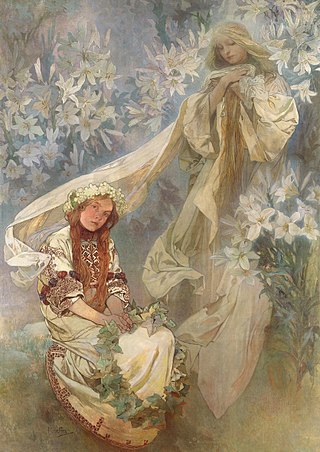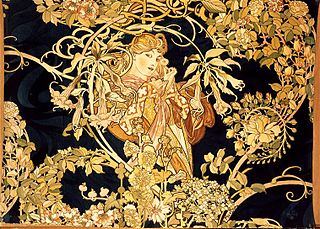Sharon, also spelled Saron, is a given name as well as an Israeli surname.
Amy is an English feminine given name, the English version of the French Aimée, which means beloved. It was used as a diminutive of the Latin name Amata, a name derived from the passive participle of amare, “to love”. The name has been in use in the Anglosphere since the Middle Ages. It was among the 50 most popular names for girls in England between 1538 and 1700. It was popularized in the 19th century in the Anglosphere by a character in Sir Walter Scott's 1821 novel Kenilworth, which was based on the story of Amy Robsart. Enslaved Black women in the United States prior to the American Civil War were more likely to bear the name than white American women because slave masters often chose their names from literary sources. The name declined in use after 1880 but was revived due to the hit song Once in Love with Amy from the 1948 Broadway musical Where's Charley?. The name peaked in usage in the United States between 1973 and 1976, when it was among the five most popular names for American girls. It remained among the top 250 names for American girls in the early 2020s.

Lucy is an English feminine given name derived from the Latin masculine given name Lucius with the meaning as of light. Alternative spellings are Luci, Luce, Lucie, Lucia, and Luzia.

Bonnie is a Scottish given name and is sometimes used as a descriptive reference, as in the Scottish folk song, My Bonnie Lies over the Ocean. It comes from the Scots language word "bonnie", or the French bonne (good). That is in turn derived from the Latin word "bonus" (good). The name can also be used as a pet form of Bonita.
Sheila is a common feminine given name, derived from the Irish name Síle, which is believed to be a Gaelic form of the Latin name Caelia, the feminine form of the Roman clan name Caelius, meaning 'heavenly'.

Eva is a female given name, the Latinate counterpart of English Eve, which is derived from the Hebrew חַוָּה (Chava/Hava), meaning "life" or "living one", the name of the first woman according to the Hebrew Bible. It can also mean full of life or mother of life. It is the standard biblical form of Eve in many European languages. Evita is a diminutive form, in Spanish.

Agnes is a feminine given name derived from the Greek Ἁγνή Hagnḗ, meaning 'pure' or 'holy'. The name passed to Italian as Agnese, to French as Agnès, to Portuguese as Inês, and to Spanish as Inés. It is also written as Agness. The name is descended from the Proto-Indo-European *h₁yaǵ-, meaning 'to sacrifice; to worship,' from which is also the Vedic term yajña. It is mostly used in Greece and countries that speak Germanic languages.
Cameron is a Scottish surname and thus somewhat common throughout the English-speaking world.
Bella is a feminine given name. It is a diminutive form of names ending in -bella. Bella is related to the Italian, Spanish, Greek, Portuguese and Latin words for beautiful, and to the name Belle, meaning beautiful in French.

Hannah spelled Hanna, Hana, Hanah, or Chana, is a feminine given name of Hebrew origin. It is derived from the root ḥ-n-n, meaning "favour" or "grace"; A Dictionary of First Names attributes the name to a word meaning 'He (God) has favoured me with a child'. Anne, Ana, Ann, and other variants of the name derive from the Hellenized Hebrew: Anna.

Angela is a female given name. It is derived from the Greek word ángelos (ἄγγελος), meaning angel from Greek mythology. In the United States, the name "Angela" was at its most popular between 1965 and 1979, when it was ranked among the top 10 names for girls. Between 1922 and 2021, in the United States, the name was ranked in the top 35 names for girls.
Anita is a feminine given name. The name and its variants are now common worldwide, especially in regions where Indo-European languages are spoken, namely Europe, South Asia, North America.

Lily is a feminine given name usually derived from lily, the flower. The name became particularly popular along with other flower names for girls during the 1800s and early 1900s. The lily also has associations with and has been symbolic of innocence and purity in Christian art. Names beginning with or containing the letter L have also been particularly fashionable for girls. It is also occasionally used as a diminutive for other names such as Elizabeth.

Ruth is a common female given name, noted from Ruth, the eponymous heroine of the eighth book of the Old Testament.

Daisy is a feminine given name. The flower name comes from the Old English word dægeseage, meaning "day's eye". The name Daisy is therefore ultimately derived from this source. Daisy is also a nickname for Margaret because Marguerite, the French version of the latter name, is also a French name for the oxeye daisy.

Emma is a feminine given name. It is derived from the Germanic word ermen, meaning "whole" or "universal". It likely originated as a short form of names such as Ermengarde or Ermentrude. Its earliest use begins at least from the early seventh century, with Frankish royal daughter Emma of Austrasia and the wife of Eadbald of Kent found in written sources. Its popularity in the medieval era increased because it was the name of Emma of Normandy, mother of Edward the Confessor. Emmeline is a Norman variant of Emma that was introduced to England by the Norman invaders in the 11th century. The name is etymologically unrelated to Amalia, Amelia, Emilia, and Emily, all of which are derived from other sources, but all of these names have been associated with each other due to their similarity in appearance and sound. Emma has been used as a short form of some of these names or shares diminutives such as Em or Emmy with them.

Ursula is a feminine given name in several languages. The name is derived from a diminutive of the Latin ursa, which means "bear". The name was best used in the Anglosphere in the 16th century but has since been rather uncommon in English-speaking countries, although its use has been influenced since the twentieth century by the Swiss-born actress Ursula Andress. It was among the most popular names for newborn girls in Germany from the 1920s to the 1950s. Ulla, Ursel, and Uschi are German short forms of the name.

Rosemary is a feminine given name, a combination of the names Rose which is a flower that belongs to the Rose family, and from the name Mary which is the name of the Virgin Mary and means Strong, Fertile. It can also be used in reference to the herb named rosemary. Rosemary has been in steady use in the United States and has ranked among the top 1,000 for 110 years. It was ranked as the 754th most popular name for American girls born in 1992. Its greatest period of popularity in the United States was between 1925 and 1950, when it was ranked among the top 150 names for girls. Rosemarie is another variant, and Romy is a German nickname for the name.

Clara or Klara is a female given name. It is the feminine form of the Late Latin name Clarus which meant "clear, bright, famous". Various early male Christian saints were named Clarus; the feminine form became popular after the 13th-century Saint Clare of Assisi, one of the followers of Saint Francis, who renounced her privileged background and founded the order of Poor Clares.
Janet is a feminine given name meaning "God is gracious" or "gift from God". It is the feminine form of John. It is a variation of the French proper noun Jeannette, Spanish proper noun Juanita, Russian Жанет (Zhanet), Circassian Джэнэт (Janet), and Hungarian Zsanett. It is also the diminutive of Jeanne or Jane.













